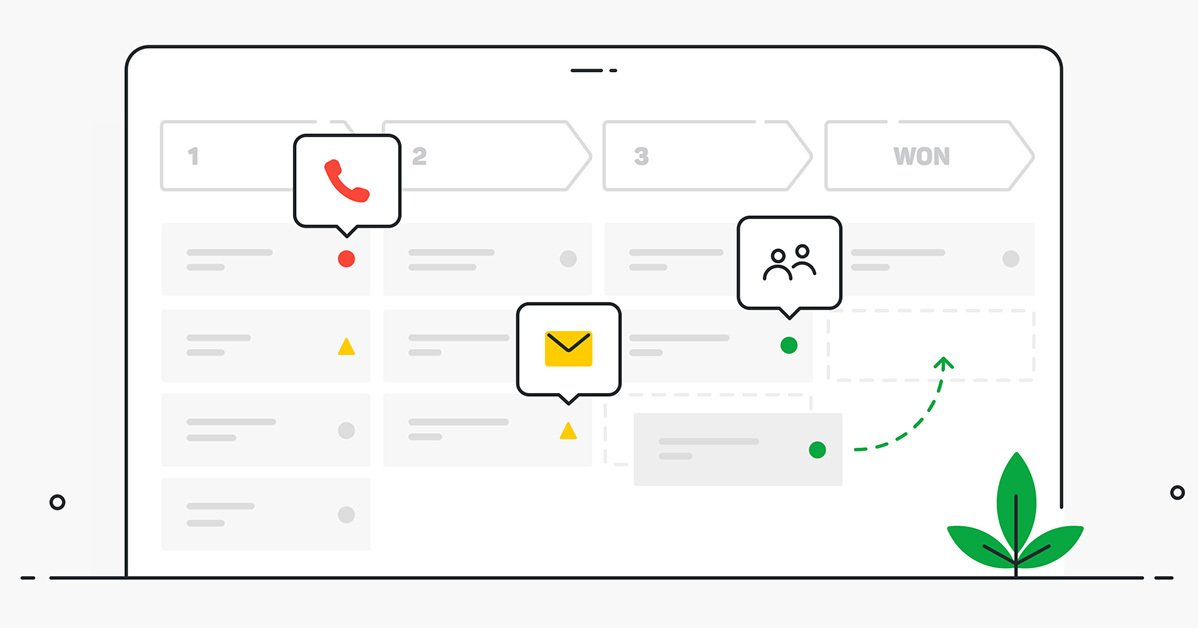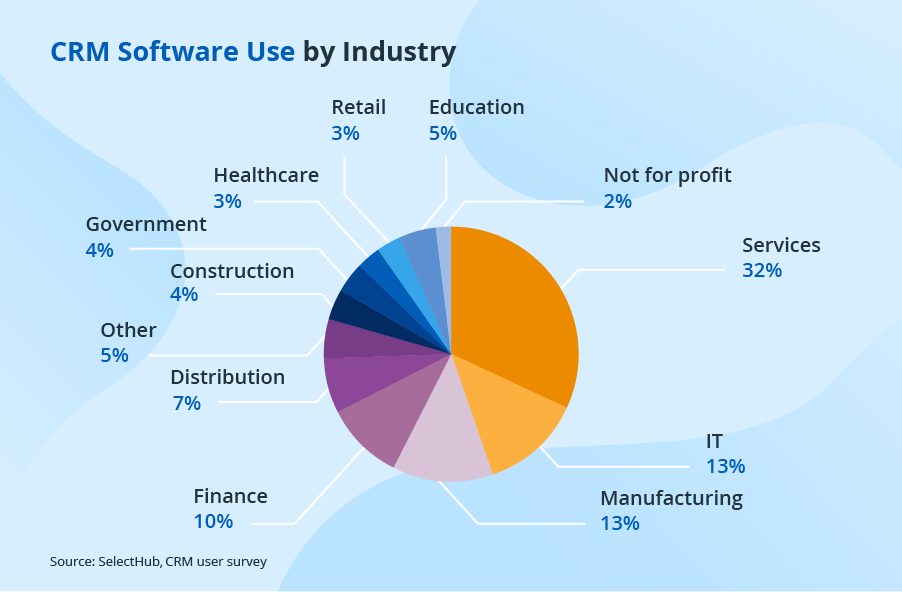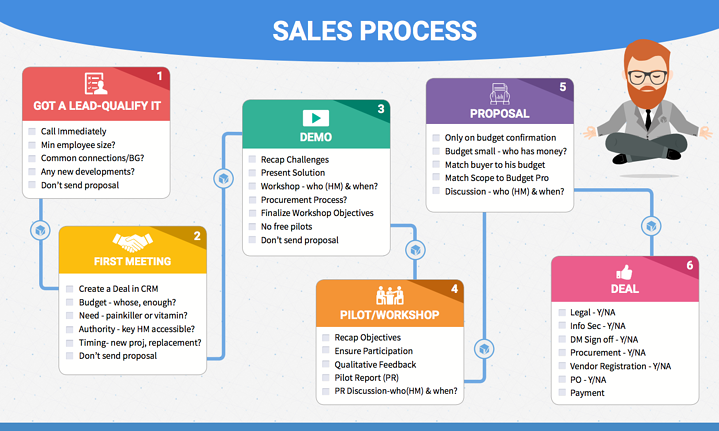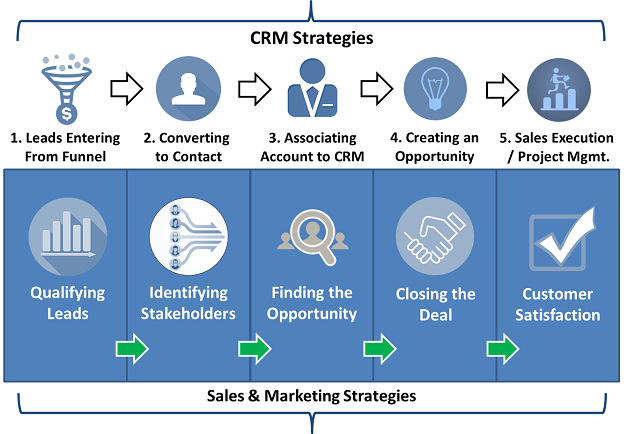Customer relationship management (CRM) is a technology that helps businesses to build and improve relationships with customers or clients with the aim of enhancing customer loyalty, communication, profits, and the internal and external functioning of a business.
After all, customer loyalty and retention are some of the most important components for generating profits.
There are a lot of processes that go into making a profitable business- sales, marketing, lead generation to name a few.
CRM systems help to collect and store information across a business as a whole and keep track of things like customer data and sales pipelines.
CRM systems store this data so that internal teams all across a business can access necessary data when they need to.
They can be particularly useful for sales teams, for example, when accessing the information on whether a lead has been contacted, or when closing a new deal with a client.
Here, we’re going to talk about why CRM is important for businesses of all sizes and ways in which it can help improve the functioning of a company.
Why is a CRM important?

There are many reasons why a business would want to adopt a CRM strategy to help improve the functioning of their business.
Firstly, the primary goal of customer relationship management is to help a business to improve its relationships with customers.
For companies large and small, customer reviews are a crucial factor in retaining and gaining a greater number of sales, which means that a good reputation is important.
If a business has fallen short in satisfying its customers, or if bad reviews have hindered its ability to gain new, loyal customers, customer relationship management helps to get them back on the path to success.
Improving customer satisfaction can assist in improving loyalty and trust, which is important for both a business’s reputation and sales.
A CRM strategy isn’t just for businesses that have struggled with retaining customers in the past but is also for successful businesses to build upon their current strategies to increase their profits.
CRM helps businesses to further understand their customers above what they already know by looking into sales insights, customer loyalty, and areas that need improving.
With a good CRM strategy in place, businesses can build a seamless communication funnel that will help them to become more efficient in providing customers with the service that they expect, which in turn, will drive the profitability of a business.
Ways a CRM helps businesses
So, now that we know what customer relationship management is and why it is important, let’s look into ways it helps businesses.
Builds customer relationships and loyalty
A business might not find it a challenge to gain customers initially, but if it is finding it difficult to maintain customer retention and increase its loyalty, there’s a problem.
Customer loyalty is a clear indicator that a business is satisfying its customers as well as building relationships, and can be the key to unlocking more leads and expanding its customer base.
Customer relationship management looks at data from previous sales to compile evidence on what is and isn’t working for the current processes.

This can include conducting surveys from customers to learning what campaigns have succeeded the best in the past and finding out who the target audience is, their interests, buying patterns, communication methods, and more.
One of the key benefits of adopting a customer relationship management strategy is that it works on improving communication between a company and its customers–both new and existing.
A good way of doing this is to use CRM software to strategize a clear step-by-step process for how a business will communicate with its customers.
Whether that’s keeping in touch with new leads via a monthly email newsletter or offering loyal customers exclusive rewards.
Another way of improving customer loyalty using a CRM system might be to compile data on a business’s target audience.
Companies should find out exactly how their audience prefers to be contacted, what they are looking for out of the products and services they purchase, and the brands they connect with.
CRM systems can be used to compile data from current, prospect, and past sales- making targeting for future campaigns more accurate.
For existing customers, CRM helps a business to strategize ways to strengthen relationships and build to improve retention.
CRM systems can help to automate things like monthly campaigns or emails, so that businesses can send out better-targeted emails to loyal customers offering them access to unique rewards, or asking for feedback.
For new or prospective customers, CRM can improve the communication process by keeping track of when customers are contacted by the sales team.
A successful customer relationship management strategy only works if businesses put the focus on what customers are looking for from a business.
Experiences for customers will only be improved when a business puts the focus back on them.
CRM systems should be used to pull information from customer data and used to help the growth of a business, finding what trends are relevant for audiences and how customer satisfaction can be improved.
Data Storage
One of the huge benefits of CRM systems is that they allow a business’s information to be stored in one place.
For companies large and small, storing data in one place allows everyone in the company to be able to access information when they need to.
This can be particularly useful when it comes to sales, as interactions with leads and customers can be tracked and shared within teams, leaving opportunities for upselling or account growth.
Secondly, data storage helps to minimize confusion and mistakes because information can be traced back to specific times.
For example, when a salesperson contacts a lead only to find that the lead is not interested, if it is tracked, other members of the team know not to contact that person to attempt to make a sale.
Whereas, without data recording, there is a possibility that another member of the sales team could contact the disinterested lead.
This not only wastes time for the sales team, but it also looks bad for the business as the lead would have to explain that they have already been contacted by the company.
When the number of mistakes in business is reduced, so too are customer complaints.
It's cost effective
With up to date data at the touch of a button, CRM systems help businesses to spend less money on strategies that produce poor results.
For example, marketing campaigns or underperforming product sales.
Since CRM is all about learning more about a business’s customers, there is more opportunity to learn about what the customer expects from a business and therefore what products, marketing techniques and methods of communication work best.
CRM systems allow a business to look into the purchase history, sales figures, and success of products or services they sell, allowing future campaigns to be more optimized.
Moreover, CRM systems also help to improve profits because businesses have a better judgment of what will sell best.
By minimizing costs on what products or services don’t work as well, businesses gain opportunities for better profit margins.
Streamlines the sales process
Customer relationship management works to help the sales process through streamlining.
When the sales process is streamlined and seamless, it helps to keep everyone in a sales team on track and gives customers clear steps for making purchases.

Are there communication issues in your company between the sales and client management teams?
Perhaps customers have found it confusing to know who to contact if they have any issues with your services?
Managing and rectifying these issues is the first step to customer relationship management success and helps to ensure that all parties involved in the sales cycle understand the process.
With a clear sales process comes an improvement in customer satisfaction which can even influence profits!
It helps with organization
The implementation of a CRM system also helps to organize a business internally.
We’ve spoken about how they can help to streamline the sales process, and through this it allows teams within a company to structure their workloads more efficiently.
Since CRM systems keep track of all data, day to day operations become a lot more organized, meetings can be scheduled through a CRM system, tasks can be prioritized and calendars help teams to track deadlines or targets.
Efficiency within an organization will shine through externally, and customers will soon be impressed at the organized and efficient sales process.
It helps with internal communication
The purpose of CRM is to enhance a business’s processes, including both internal and external communication.
Internally, if the sales team has a clear understanding of the processes and all sales information is stored in one place, it minimizes the likelihood of mistakes and confusion and improves team communication.
Let’s think of it this way–if a hotel business operated without a CRM system and instead relied on pen and paper to keep track of bookings, an in-house team working different days of the week might fail to keep track of whether new guests were arriving early or any specific requirements, because the chances of a team missing information written down are more likely.
With a CRM system, every booking would be logged so the team on shift knows the exact time of expected arrival for each new guest and any special requirements.
What’s more, it’s not just the sales team that can benefit from a CRM system.
Any team within a company that needs to find information about a sale, customer, or campaign can search using the CRM system.
Since the information is stored in one place, it prevents confusion across the whole business and saves time because teams don’t need to wait for another team to seek out the information they need.
Better targeted marketing campaigns
With the help of a CRM system, marketing campaigns can be better targeted at customers depending on their stage in the sales cycle.

You might target your campaigns based on whether they are leads, new customers, or loyal customers/brand advocates.
With better-targeted and more personalized communications from past sales data, future marketing, and sales processes become more aligned and specific to each target audience.
It can help to increase profits
All of the above are components within CRM that can contribute to an increase in profits.
With more streamlined processes in place and detailed data, businesses can expect their customer satisfaction and loyalty to improve–which can have a direct effect on sales.
By utilizing important CRM data, businesses can find better ways to reach leads and new customers, as well as marketing methods for communicating with loyal customers.
The result? A clear opportunity for growth of profit margins.
Conclusion
Customer relationship management isn’t for simply finding faults in your business.
It’s about understanding how you can improve your business for everyone involved.
Implementing a CRM system is important for improving their processes and to create a company that shows that it values its customer relationships as well as its internal communications.
Ultimately, CRM systems provide trackable data that every business can use to benefit their future campaigns, marketing communications, and sales processes.
Looking to implement a CRM strategy for your business?
Revcarto can help find a customer relationship management process that works for your business. Get in touch today!


